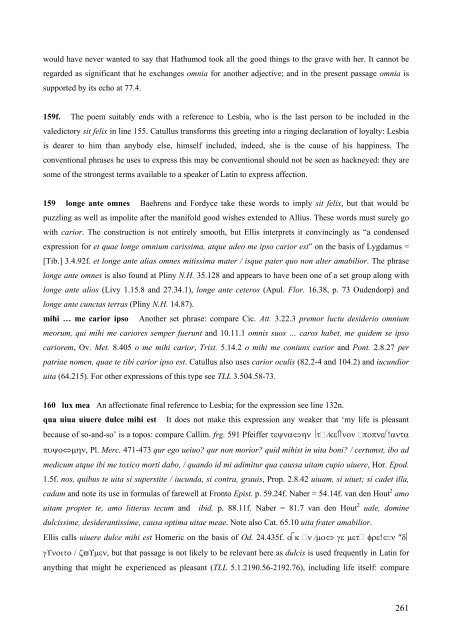CATULLUS 68 - Scuola Normale Superiore
CATULLUS 68 - Scuola Normale Superiore
CATULLUS 68 - Scuola Normale Superiore
Create successful ePaper yourself
Turn your PDF publications into a flip-book with our unique Google optimized e-Paper software.
would have never wanted to say that Hathumod took all the good things to the grave with her. It cannot be<br />
regarded as significant that he exchanges omnia for another adjective; and in the present passage omnia is<br />
supported by its echo at 77.4.<br />
159f. The poem suitably ends with a reference to Lesbia, who is the last person to be included in the<br />
valedictory sit felix in line 155. Catullus transforms this greeting into a ringing declaration of loyalty: Lesbia<br />
is dearer to him than anybody else, himself included, indeed, she is the cause of his happiness. The<br />
conventional phrases he uses to express this may be conventional should not be seen as hackneyed: they are<br />
some of the strongest terms available to a speaker of Latin to express affection.<br />
159 longe ante omnes Baehrens and Fordyce take these words to imply sit felix, but that would be<br />
puzzling as well as impolite after the manifold good wishes extended to Allius. These words must surely go<br />
with carior. The construction is not entirely smooth, but Ellis interprets it convincingly as “a condensed<br />
expression for et quae longe omnium carissima, atque adeo me ipso carior est” on the basis of Lygdamus =<br />
[Tib.] 3.4.92f. et longe ante alias omnes mitissima mater / isque pater quo non alter amabilior. The phrase<br />
longe ante omnes is also found at Pliny N.H. 35.128 and appears to have been one of a set group along with<br />
longe ante alios (Livy 1.15.8 and 27.34.1), longe ante ceteros (Apul. Flor. 16.38, p. 73 Oudendorp) and<br />
longe ante cunctas terras (Pliny N.H. 14.87).<br />
mihi … me carior ipso Another set phrase: compare Cic. Att. 3.22.3 premor luctu desiderio omnium<br />
meorum, qui mihi me cariores semper fuerunt and 10.11.1 omnis suos … caros habet, me quidem se ipso<br />
cariorem, Ov. Met. 8.405 o me mihi carior, Trist. 5.14.2 o mihi me coniunx carior and Pont. 2.8.27 per<br />
patriae nomen, quae te tibi carior ipso est. Catullus also uses carior oculis (82.2-4 and 104.2) and iucundior<br />
uita (64.215). For other expressions of this type see TLL 3.504.58-73.<br />
160 lux mea An affectionate final reference to Lesbia; for the expression see line 132n.<br />
qua uiua uiuere dulce mihi est It does not make this expression any weaker that ‘my life is pleasant<br />
because of so-and-so’ is a topos: compare Callim. frg. 591 Pfeiffer τεψνα⇔ην ⎟τ ⁄κε⇑νον ποπνε⎛!αντα<br />
πυψο⇔μην, Pl. Merc. 471-473 qur ego ueiuo? qur non morior? quid mihist in uita boni? / certumst, ibo ad<br />
medicum atque ibi me toxico morti dabo, / quando id mi adimitur qua caussa uitam cupio uiuere, Hor. Epod.<br />
1.5f. nos, quibus te uita si superstite / iucunda, si contra, grauis, Prop. 2.8.42 uiuam, si uiuet; si cadet illa,<br />
cadam and note its use in formulas of farewell at Fronto Epist. p. 59.24f. Naber = 54.14f. van den Hout 2 amo<br />
uitam propter te, amo litteras tecum and ibid. p. 88.11f. Naber = 81.7 van den Hout 2 uale, domine<br />
dulcissime, desiderantissime, causa optima uitae meae. Note also Cat. 65.10 uita frater amabilior.<br />
Ellis calls uiuere dulce mihi est Homeric on the basis of Od. 24.435f. ο⎡κ ν ⁄μο⇔ γε μετ φρε!⇐ν ″δ⎜<br />
γϒνοιτο / ζϖϒμεν, but that passage is not likely to be relevant here as dulcis is used frequently in Latin for<br />
anything that might be experienced as pleasant (TLL 5.1.2190.56-2192.76), including life itself: compare<br />
261






